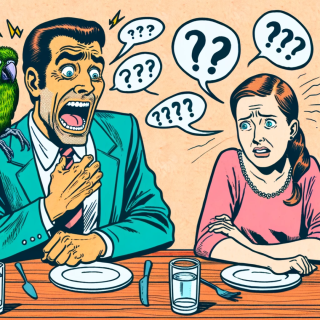Anxiety
Accommodating Anxiety in Romantic Relationships
How to kick your partner’s panic out of bed.
Updated February 14, 2024 Reviewed by Ray Parker
Key points
- Accommodating a partner's anxiety can make you resentful as well as make your partner's anxiety worse.
- Anxiety accommodation can include taking over tasks, planning to avoid triggers, and constant reassurance.
- You can break the cycle by helping your partner find ways to cope, empathize, and encourage them to find help.

By Sean Minns and Darby Saxbe
It's Valentine's Day. You're on a date at a charming little French bistro. The ambiance and wine were great, and the waiter brought out the main courses. The night is perfect until your partner gets an email from his colleague. Suddenly, you see a wave of panic sweep through his face; he starts hyperventilating, his fingers clench the phone, and the all too familiar and somewhat irksome phrase slips out: "Can you please check this email? I really can't. I'm sure it's something bad. Oh God, I can't breathe. Can we go home and brainstorm a good response."
You already know that the date is over. You will need to check his email, and the rest of the evening will be spent crafting the "perfect" response to an otherwise mundane email.
You realize you can't even have a date night that isn't third-wheeled by your partner's anxiety. But it's not just them. What started as a relationship marked by support and understanding has somehow morphed into a cycle where you feel the continuous pressure of managing your partner's anxiety.
What's worse, at a certain point, you may have started to encourage your partner's anxiety unintentionally. You may have become a "panic parrot," where you find yourself repeating their worries and helping them avoid situations that could cause them distress.
Here is the good news: It is possible to stop parenting your partner and start dating them again. Patterns can be broken if they are understood. Let's explore the nature of anxiety accommodation in romantic relationships.
Anxiety and Avoidance
First, let's understand what causes and maintains the cycle of anxiety.
Anxiety refers to excessive worry and fear of negative consequences in situations of uncertainty. It often manifests both mentally (such as chronic worrying, rumination, and stress) and physically (such as sweating, hyperventilating, increased heart rate, etc). Anxious individuals often try to avoid these unpleasant mental and physical feelings by avoiding situations that make them anxious.
For instance, if a person has social anxiety, they may avoid these distressing feelings by not going to parties or social events. While not going to a social event may temporarily help them avoid feelings of anxiety, it reinforces the idea that social events are indeed "stressful" or negative events. Therefore, in the long term, avoidance can reinforce negative beliefs that lead to anxiety.
The gold-standard treatment for anxiety is exposure therapy, where trained mental health professionals help anxious individuals face their fears. By facing their fears, individuals can often disconfirm their worst-case scenario. For instance, a therapist may find ways to help a socially anxious individual participate in controlled social events where they can get a chance to disconfirm their fears. As these individuals gain more exposure to such events, they realize that their worst fears often fail to materialize, gradually reducing their anxieties.
Interpersonal Emotion Regulation and Healthy Support
Love hurts, literally. As cliché as it sounds, we truly feel our loved one's pain, which can make it harder not to help if we see that our partner is distressed. For example, a study found that when we see a romantic partner suffer, the pain center of our own brains light up, and the closer we are to our partner, the more pain we feel.
It's no wonder we feel the urge to help our significant other when we see them in distress and do what we can to help make them feel better. When we see our loved ones crying, we feel bad as well, and that feeling can lead us to comfort them. Or if we see our partner looking overwhelmed, we may look for things we can take off their plate to make their life easier.
Most of the time, this desire to comfort your partner is usually a healthy one. Humans are a social species, and while it's important to cultivate ways to manage our emotions (emotional self-regulation) effectively, we will naturally influence the emotions of others and, in turn, be influenced by them. In a healthy relationship, we don't have to exist as an emotional island. Instead, couples can assist each other in sailing through emotional waters and provide a sense of security in an uncertain world.
When Support Is Not Support
When you date someone with anxiety, you could find yourself being leaned on a lot more than usual. This is where things get tricky. The desire to help can paradoxically lead to fueling your partner's anxiety and hurting your relationship. Often, support is not support
Your partner may ask if the date is going well, seek validation on their dessert choice, or pressure you to drive home since they feel nervous. You may feel you're being helpful, but you're essentially encouraging your partner's avoidant behavior.
Research has shown that being a non-anxious partner in a relationship with an anxious individual can be challenging. Non-anxious partners often find themselves putting in tremendous effort to accommodate their partner's anxiety, engaging in behaviors that help their anxious partner avoid anxiety-provoking thoughts, feelings, or situations.
While non-anxious partners often fall into these maladaptive patterns with noble intentions of helping their anxious partners, paradoxically, these "anxiety accommodations" can end up further encouraging the partner's avoidance and play a role in maintaining their anxiety.
For instance, a study led by researchers at the University of North Carolina, Chapel Hill, highlighted the negative effects of anxiety accommodations. The study examined cohabiting couples wherein one partner suffered from obsessive-compulsive disorder (OCD)—a common anxiety disorder. They found that anxiety accommodations provided by non-anxious partners were linked to worse treatment outcomes for the anxious partner. This was in stark contrast to individuals whose partners refrained from anxiety-accommodation behaviors and who showed more positive treatment outcomes.
Common Forms of Anxiety Accommodation
1. Taking over responsibilities
A common form of anxiety accommodation is for loved ones to take over responsibilities that bring their partner distress. This can involve taking over responsibilities that the partner can do themselves, such as making reservations or engaging in behaviors to reassure your partner, such as repeatedly agreeing to check if the garage door is closed.
2. Planning to avoid potential triggers
Do you plan to avoid anxiety triggers for your partner, such as going to crowded restaurants? Or change your routine so your partner doesn't have to deal with a stressful situation like going to a social event alone? These behaviors may encourage your partner's anxiety because it prevents them from being exposed to the anxiety-provoking situation and eventually habituating to them.
3. Constantly reassuring and validating them
It's common for anxious individuals to repeatedly seek reassurance from others about things they're worried about. Reassuring them may make them seem less stressed at the moment. However, in the long run, it could stop them from developing the skills they need to feel confident in their judgments.
How to Break the Cycle and Start Supporting
Once we fall into a pattern of accommodating our partner's anxiety, it can be hard to stop. It is hard not to respond when we see our partner suffering.
One approach is instead of providing support by taking over responsibilities; you can encourage your partner to find healthy ways to cope with their distress. For instance, you could provide them with support and encouragement and remind them that they have been able to overcome challenges before and that you fully believe that they will be able to handle this themselves.
Another way to truly support them is to empathize with their pain without actually taking over the stressful task. Having anxiety can be an extremely painful and scary feeling. As a partner, you can always empathize by giving your partner verbal or non-verbal support and reminding them that you care about them and that you are sorry that they are going through this—without taking over responsibilities or finding other ways to avoid anxiety-provoking situations.
For instance, in the French bistro example from earlier, you could gently rub their back and remind them to take slow, deep breaths. Once their panic attack subsides, you can tell them you love them and are sorry that they are feeling so much pain but remain firm on not checking their phone for them.
Finally, if you suspect that your partner is suffering from an anxiety disorder, you can help them by encouraging them to see a therapist. At the end of the day, emotional support is as far as you can go as a partner. A trained mental health professional often has tools that can help treat underlying chronic anxiety.
Take Care of Yourself
Regardless of your approach, it's important to keep our mental well-being in mind. In every relationship, there's an aspect of emotional contagion, where we pick up on our partner's stress. When dating someone with anxiety, it's important to be particularly mindful of maintaining good boundaries and habits of self-care.
To find a therapist, visit the Psychology Today Therapy Directory.
Sean Minns is a graduate student in the USC Clinical Psychology Ph.D. program.
References
Boeding, S. E., Paprocki, C. M., Baucom, D. H., Abramowitz, J. S., Wheaton, M. G., Fabricant, L. E., & Fischer, M. S. (2013). Let me check that for you: Symptom accommodation in romantic partners of adults with obsessive–compulsive disorder. Behaviour research and therapy, 51(6), 316-322.
Bodenmann, G., Ledermann, T., & Bradbury, T. N. (2007). Stress, sex, and satisfaction in marriage. Personal relationships, 14(4), 551-569.
Fischer, M. S., Baucom, D. H., Abramowitz, J. S., & Baucom, B. R. (2022). Interpersonal emotion dynamics in obsessive–compulsive disorder: Associations with symptom severity, accommodation, and treatment outcome. Couple and Family Psychology: Research and Practice.
Kasalova, P., Prasko, J., Ociskova, M., Holubova, M., Vanek, J., Kantor, K., ... & Barnard, L. (2020). Marriage under control: obsessive compulsive disorder and partnership. Neuroendocrinology Letters, 41(3), 134-145.
López-Solà, M., Koban, L., Krishnan, A., & Wager, T. D. (2020). When pain really matters: A vicarious-pain brain marker tracks empathy for pain in the romantic partner. Neuropsychologia, 145, 106427.
Neal RL, Radomsky AS. What do you really need? Self- and partner-reported intervention preferences within cognitive behavioural therapy for reassurance seeking behaviour. Behavioural and Cognitive Psychotherapy. 2020;48(1):25-37. doi:10.1017/S135246581900050X
Zaider, T. I., Heimberg, R. G., & Iida, M. (2010). Anxiety disorders and intimate relationships: a study of daily processes in couples. Journal of Abnormal Psychology, 119(1), 163.




